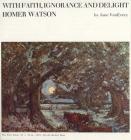1
'With Faith, Ignorance, and Delight' Homer Watson. The cover of a book by Jane VanEvery
1960
Doon, Ontario

2
Tom VanEvery is the son of author Jane VanEvery. Tom reads from his mother's book, a biography of Homer Watson called "In Faith, Ignorance & Delight"
3
Tom Van Every reads from Homer's biography
2004
Doon, Ontario

4
"My name is Tom VanEvery. I am reading from a biography of Homer Watson, written by Jane VanEvery...
"The eyes are deep holes, and from them, through bushy brows, twin streams of light, flickering streams, laughing streams, somber streams, hair blowing from a high forehead, a great beak of a nose, and a black Van Dyke beard…talk too, enchanting talk, like the sound of the play of water, always beyond me, trying to follow it when I was a child, but I never could. Still, I knew that it was of beauty and of paint. You could see the beauty of paint in land and tress and water all around you. It was there in the gallery, that gallery and that house. It has now greatly changed, but still carries with it a certain aura."
5
Tom Van Every reads from Homer's biography (2)
2004
Doon, Ontario

6
"Homer Watson was a strong man, still it was not his strength that caused you to look and look again, it was the inner blaze, one look and you knew. You lowered your eyes, offered difference and went on. Knowing you had encountered a man worth knowing, one who saw further than most. Through his painting, he had got transitory influences, principally during his stay in England. He was still preeminently a man of the soil, trying to preserve the specific qualities of the Ontario landscape, at a time when this was a wild country undergoing the rape of the pioneers plow and saw. This was his country and he was the first Canadian born artist to win recognition abroad."
7
Tom Van Every reads from Homer's biography (3)
2004
Doon, Ontario

8
"Like his mother, Homer was courageous. In her diary, Phoebe tells us that the Watson yard was full of mighty logs for sawing. The tamarack, whose gum, and the pine pitch, had to be boiled. Homer once brought some home in a tin and set it on the kitchen stove. The pitch ignited and blazed up to the ceiling. But Homer grabbed the tin and through it outdoors when he managed to get the fire out."
9
Tom Van Every reads from Homer's biography (4)
2004
Doon, Ontario

10
"From his father, perhaps he inherited a love for the beautiful. He had within him an urge to create this beauty from what he saw. The urge consumed all his waking hours. He made images from his food before he ate it. He carved images of trees on fence rails with a jack knife. He was forever drawing. When he had India ink, he used it. And when he had a tin of a bit of colour, he used it. But most of his sketches were made with pencil. Boxes and drawers filled up with sketches. There was no copying, everything was done from impressions on his mind and directly from nature, as it was later. His mind was like a camera and he would reproduce almost exactly the scene that had attracted him."
11
Tom Van Every reads from Homer's biography (5)
2004
Doon, Ontario

12
"Homer's sketches were mostly landscapes, but now and again, he would try portraiture. The face of the teacher Mr. Burkholder took his fancy. He had a crooked nose from some former accident, and when his wig slipped, as it often did, Homer would take a chance and quickly sketch the ludicrous effect. For which he would receive a resounding whack across the knuckles. "You can draw trees if you will" said Mr. Burkholder, "but not the human form divine!"
13
Tom Van Every reads from Homer's biography (6)
2004
Doon, Ontario

14
"When Homer was twelve, and Jude 14, they worked in the summer time at the brickyard and in winter cut timber out in the woods. That year, catastrophe came upon them. Jude fell into the whole were the clay was mixed, his head was crushed and he was brought home and laid on the lawn were he died. That was a sad day in the Watson home. Homer felt in some way responsible. Fearing that because he was near, he ought to have done something. But what that something was, he did not know. Heart broken, Homer brooded, wandering over the fields, going back to nature his one great love, for comfort. Always under the Doon sky, and the seven dams glittered, reflecting the march of the trees down from the pinnacle."

